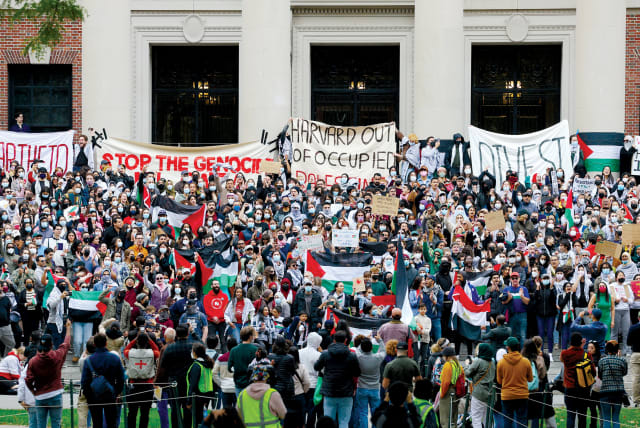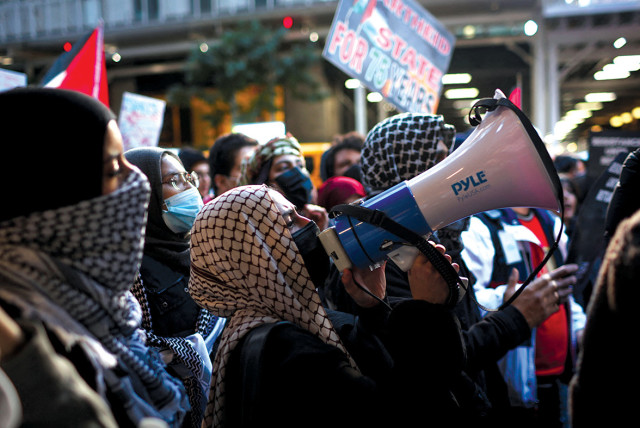Did years of pro-Hamas support on US campuses lead to October 7? - opinion

Western academic bone fides helped Hamas gain international legitimacy, even for its terror actions, to which global condemnations of Israel’s war against Hamas attest.
Hamas’s invasion of southern Israel and its massacre of more than 1,200 civilians and soldiers, and its kidnapping of 240, was a “strategic surprise” as military literature would define it, hearkening back to Imperial Japan’s historic Pearl Harbor attack.
Terrorist atrocities such as Al-Qaeda’s 9/11 in New York and Washington, DC, in 2001; the 7/7 London train bombings in 2005; and the March 2004 Madrid train bombings are contemporary examples of strategic surprise.
But the Hamas-inspired Students for Justice in Palestine’s public and popular antisemitic incitement across the United States on some 250 university campuses has not constituted a strategic surprise. SJP has openly supported Hamas and other Palestinian terror organizations under the sanction and protection of some of America’s leading universities.
Western academic bone fides helped Hamas gain international legitimacy, even for its terror actions, to which global condemnations of Israel’s war against Hamas attest. Recent sanctions of SJP by Columbia, Brandeis, and Rutgers, and most recently, university administrators, suggest a newfound understanding of the deepening and palpable threat this mainstreamed organization poses to Diaspora Jews and Israel alike.
How Hamas's atrocities against Israel enjoy support on US campuses
The October 7 atrocities, coined the “Al-Aqsa Flood” after Jerusalem’s Al-Aqsa Mosque, attested to the assault’s ideological and religious motivations and its goal: the elimination of the one and only Jewish and democratic state.
It is no less surprising to witness Hamas’s political strategy in action: Since 10/7, broad demonstrations of support have been on display on campuses across the US, from New York University to Harvard and the University of Pennsylvania. Pro-Hamas demonstrations across scores of American universities were shocking in both their public affirmation of Hamas’s genocidal mass murder and in their rhetoric, echoing that of Hamas. At Hunter College in New York, the crown jewel of the City University system of New York, an article by Emma Green in the New Yorker magazine documents language and expressions used by campus activists that parallel Hamas jihadi rhetoric in Gaza and in Palestinian-controlled areas in the West Bank.
Green notes that many campus protesters, Arab and Muslims among them, led the chants and incantations in Arabic, and were explicitly religious. Protesters chanted “Takbir!” calling for the glorification of God; “Allahu akbar” (“God is greater”); “There is no god but God,” in Arabic; and references to “the martyrs…those who have died in Gaza and Palestine.” Religious-themed rhetoric has punctuated SJP protests since 2010, even after it became a centralized national student organization receiving budgetary support from host universities. Harvard University, for example, has provided financial support to the annual SJP-led Israel Apartheid Week – a festival of hatred with genocidal rhetoric calling for the erasure of Israel and Israel-supporting Jewish communities on campuses across North America.
The convergence of years of SJP-led antisemitism on some 250 campuses across the United States, and Hamas’s 10/7 mass murder of Jews (and some 30 Muslim Israelis), is also not a strategic surprise. SJP and its sister organization the Palestine Solidarity Committee have for years openly called for Israel’s destruction, chanting “From the river to the sea, Palestine will be free” – the clarion call for the genocide of the Jews reflected in Hamas’s founding document, authored in part by Abdullah Azzam, Osama bin Laden’s mentor.
In fact, SJP has platformed Hamas and other Palestinian terror groups, including Palestinian Islamic Jihad and the Popular Front for the Liberation of Palestine, since its founding in the early 1990s and has broadened, centralized, and strengthened its national activity and protest culture since 2010, transforming America’s finest universities into hotbeds of radicalism and extremism. By 2018, a New York SJP chapter at CUNY rebranded as the extremist Within Our Lifetime (WOL). Its student leader, Nerdeen Kiswani, was recorded at a protest in 2021 declaring, “We want all of it” – meaning all of “Palestine” – including modern-day Israel.
Kiswani’s rhetoric paralleled the Islamist Hamas 1988 charter, which calls explicitly for the murder of Jews and the establishment of an Islamic trust over geographical Palestine, from the Jordan River to the Mediterranean Sea, the ubiquitous incantation at SJP protests. Likewise, in 2021, WOL launched a campaign to “Globalize the Intifada,” which “comes from the urgent need to defend our lands, resist our oppressors, and break free from the genocidal grip of US imperialism and Zionism.”
The October 7 massacre only served to energize SJP’s genocidal libel, metastasizing across US university campuses. Days after the atrocities, SJP hosted a National Day of Resistance throughout the United States. Protest leaders declared: “Gaza broke out of prison” and breach(ed) the illegitimate border fence back into ’48 Palestine.”
At a rally at Cornell University organized by SJP, Prof. Russel Rickford said that Hamas’s acts “exhilarated” and “excited” him. SJP chapters posted pictures and graphics on social media of invading Hamas paragliders, celebrating its deadly assault on young Israeli party goers on the Simchat Torah holiday weekend. Hours after the 10/7 massacre, George Washington University SJP issued a statement justifying the massacre, reflecting the student group’s ever-increasing radicalization.
The Columbia University Social Workers 4 Palestine referred to the Hamas massacre as a “counteroffensive and the centrality of revolutionary violence to anti- imperialism.” This was a searing statement by social workers, mandated to help trauma victims such as orphans, widows, widowers, friends, and rape victims of Hamas.
SJP’s jihadi narrative has whitewashed terrorism and mass murder, transforming the student organization into a conduit for pro-jihadi activism, while academically intellectualizing and equivocating Hamas massacres. In short, SJP’s nationwide aggressive actions, initiatives, and programming have signaled to Hamas and other colluding terror organizations that they could carry out the mass murder of Israelis with limited repercussions in the West.
The results speak for themselves. A November 2023 poll revealed that 35 percent of Americans blamed Israel for the current war with Hamas and expressed doubts over Hamas’s rape of Israeli women. The poll also reflected the West’s uncritical acceptance of Gaza casualty numbers as provided by the Hamas-controlled Gaza Ministry of Health. While several US universities, including Brandeis, Columbia, and Rutgers, have shuttered their SJP branches, its ideology, growing membership, freedom of action, and influence on university campuses require scrutiny and moral clarity.
Taking immediate action is particularly pressing in view of the refusal of university presidents representing Harvard, MIT, and University of Pennsylvania in a December 5 congressional testimony to define, prohibit, or condemn genocidal declarations against Jews on campus as “harassment” in violation of their universities’ code of conduct.
Countering the current Hamas-supporting antisemitic crusade should include prohibiting genocidal speech targeting Jews or the Jewish state; enforce title VI of the 1964 Civil Rights Act to protect Jews and Israelis on campus as ethnic minorities; remove the nonprofit status of universities refusing to cooperate; and turn back billions of dollars in Qatari funding of Middle East studies programs.
This is a moment requiring moral clarity, commitment, and courage opposite Hamas’s SJP loyalists’ Nazification of the Jews and their one and only nation-state, both of which Hamas attempted to destroy on October 7. ■
Dr. Dan Diker is president of the Jerusalem Center of Public Affairs. Khaled Abu Toameh is a senior fellow at the JCPA and a distinguished senior fellow at the New York-based Gatestone Institute.
Jerusalem Post Store
`; document.getElementById("linkPremium").innerHTML = cont; var divWithLink = document.getElementById("premium-link"); if (divWithLink !== null && divWithLink !== 'undefined') { divWithLink.style.border = "solid 1px #cb0f3e"; divWithLink.style.textAlign = "center"; divWithLink.style.marginBottom = "15px"; divWithLink.style.marginTop = "15px"; divWithLink.style.width = "100%"; divWithLink.style.backgroundColor = "#122952"; divWithLink.style.color = "#ffffff"; divWithLink.style.lineHeight = "1.5"; } } (function (v, i) { });

